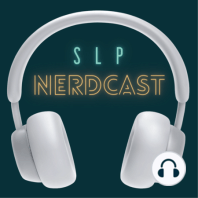57 min listen
Collaborating with BCBAs
FromSLP Nerdcast
ratings:
Length:
56 minutes
Released:
Feb 23, 2020
Format:
Podcast episode
Description
UPDATE: This episode was recorded and published with an error (@ timestamp 6:35). INTERprofessional collaboration is collaboration between different fields or professions (example: an SLP collaborating with a BCBA). INTRAprofessional collaboration is collaboration within one field (example: an SLPs collaborating with other SLPs). In our recording we swapped the two - blame it on first episode jitters!A BIG THANKS to our listener who brought this to our attention! You know who you are!!___Get .1 ASHA CEU hereWelcome to our first post! This podcast was a big one for us in so many ways! Since we are just a couple of nerds, who are also friends, and actually do spend an inordinate amount of time talking about “nerdy speech and language things” in our free time - the idea of being a bit more structured in our topics and recording our conversations for others to hear was an idea we threw around for a while. It became our brain baby. We were nervcited* about it. And now it is real.Why start our podcasting journey here? Collaborating with BCBAs has been an ongoing thread running through both of our careers in speech language pathology. BCBA/SLP relationships can be a polarizing topic on both sides of the office/school/clinic. We’ve personally had some great experiences, and some not so great ones. We both went through a post-graduate certificate program to become BCBAs (Kate took the exam and has the letters to prove it). We’ve both been challenged with difficult collaborative situations, and we’ve been on the sidelines to see the challenges experienced by our colleagues in their working relationships with others.So why collaborate in the first place? Well, to begin with it’s the ethical choice. Our ASHA code of ethics is long, but there are some clear points made as to why it is ethical to collaborate. Plus, the field of ABA sometimes gets a bad rep - BCBAs and the field of ABA in general can have a lot to offer. We have both found it to be a great compliment to our speech therapy practices. Unfortunately, sometimes collaborating is a hard road, for a variety of reasons, and most of us don’t receive any type of explicit training on this in graduate school. How do we navigate these relationships as a professional? Do we even have to? Is it worth all the potential hassle? In this podcast we will talk in depth about the why and the how of intraprofessional collaboration with BCBAs. Spoiler alert: We’ve both had the good fortune of some wonderful shared clinical experiences with BCBAs - and we really think it is an experience worth figuring out!Come join us, be our nerdy friend, listen, learn, and earn ASHA CMHs (other providers check with your credentialing organization to find out if our quiz and certificate of participation counts toward the professional development requirements for your license, email us with any questions!).*Nervcited - a word we are pretty sure we invented. It's that weird combination of simultaneously feeling nervous and excited about something.ASHA Professional Development hours are offered for this course (1 certification maintenance hour). Visit our ASHA Professional Development page for more information .Learning Outcomes1. Provide at least 3 descriptive facts about applied behavior analysis2. Describe at least 2 reasons to collaborate with behaviorally oriented professionals3. Identify at least 2 barriers to collaborating4. Identify at least 2 strategies for effective collaboration.ReferencesCooper, J. O., heron, T. E., & Heward, W. L. (2007). Applied Behavior Analysis (2nd Ed.) New York, NY: PearsonDonaldson, A. L. & Stahmer, A. C. (2014). Team Collaboration: The Use of Behavior Principles for Serving Students with ASD. Language, Speech, and Hearing Services in Schools, 45, 261–276Stone, Douglas., Bruce Patton, and Sheila Heen. Difficult Conversations: How to Discuss What Matters Most. New York, N.Y.: Viking, 1999Online ResourcesBehavior Analyst Certification BoardASHA Guidelines for Caseload and WorkloadDis
Released:
Feb 23, 2020
Format:
Podcast episode
Titles in the series (100)
Bringing it all Together: Aided Language Modeling by SLP Nerdcast
